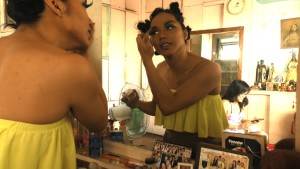Film review: ‘It Runs in the Family’ is a revelation
SAN FRANCISCO — A road documentary, It Runs in the Family (2016), by Filipino Canadian filmmaker Joella Cabalu strives for an understanding of sexual identity in the Filipino diaspora.
The film recently won the People’s Choice Award for Best Feature at the 2016 Vancouver Queer Film Festival and the Audience Choice Award at the 2016 Seattle Asian American Film Festival.
The 45-minute film is on the short side by industry standards, but it is rich and thought provoking. Lensed by three Filipina lesbian cinematographers, Nana Buxani, Peggy Peralta and Angelina Cantada, the film is an investigation, spanning Canada, the U.S. and the Philippines, of homosexuality within the Cabalu family.
The impetus behind the project came from an “alarming comment” that their “ancestors sinned so much that their blood was cursed”– the curse of being queer–and “how their gay relatives were coping with this supposed curse.”
It Runs in the Family is an exploration of queerness and roots. In the case of its main subject, Filipino Canadian artist, Jay Cabalu, this exploration is a bridge between his identity and heritage across the Pacific.
The Cabalus immigrated to Vancouver from Manila in 1991. As immigrant children in a foreign land, the siblings Joella and Jay only had each other. “We didn’t really have other friends,” Jay says. Furthermore, Jay had to deal with a clashing dichotomy within himself–being gay and Catholic.
“I always had to have two parts of my life… the part that I knew and the part I projected to everybody else.” Jay reflects on his journey in his studio amid a self-portrait collage in progress where he pieces together an obscured version of his image from pages torn off newspapers and magazines.
This journey introduces us to a lesbian cousin, Monica Sales-Cuyong, in Oakland, a gay uncle, Cris, in Manila as well as a gay cousin in drag, Jazz Pasion, who is loved by his family in spite of them being devout Catholics.
What is most interesting in this exploration is the revelation of a notion of sexual identity different from that of Philippine society, one that has since gone beyond religious-cultural norms and values having adopted so-called progressive western concepts of sexual identity.
This is exemplified when Jazz’s father admits in the film that he does not understand and care much about the labels “trans or LGBT” but sees his son just like any other human being. This idea is not explicitly examined, but it is where the film’s hidden virtue can be found: It prompts the viewer to question the origins of the “curse” and how it figures in Philippine society and the diaspora.
There was a time when homosexuality was the catchall term for anything other than heterosexuality in the Philippines. Yet sexual identity and fluidity have roots that reach far back into ancient history.
Pre-colonial cultures in the Philippines, based on a matriarchal society, embraced crossing genders. The most powerful queer members of society were able to cross between worlds seen and unseen were highly revered–shamans, healers and leaders known as babaylans or catalonans–intermediaries between the corporeal and the spirit world with a strong influence throughout society.

Jazz Pasion prepares for pride parade in Manila with filmmaker Joella Cabalu in the background. CONTRIBUTED
When the Spaniards occupied the islands with the Cross and their swords, they saw the babaylans to be quite strange and a threat. Religious subjugation and cultural repression followed and western machismo infiltrated the indigenous psyche, causing pre-colonial concepts of sexual identity to become skewed.
Queerness became a sickness supposedly cured through prayer, faith and devotion to the Church that ironically abound with sordid tales involving priests and altar boys. Philippine society has begun to come out of this rut through the indoctrination, by way of American colonial and neo-colonial influence, to western and progressive notions of sexuality that indigenous Filipinos had long understood and inherently known.
With the resurgence of awareness about sexual identity in the Philippines, celebrated in the film with scenes of Jay and Jazz in a pride parade in Manila, it shows that Filipinos have come full circle in recognizing and accepting something that is a vital part of their heritage and that of the world.
In the end, the “curse” that runs in the family can be seen as a blessing. The film acts as a catalyst for awareness and understanding on different levels about an issue that is deeply rooted in heritage and history. In this way, It Runs in the Family goes beyond the scope of what its title suggests. The exploration is no longer confined to the Cabalu family but is extended to include the entire Filipino diaspora.
Production Company: OUTtv & Meaningful Films Ltd.
Starring: Jay Cabalu, Monica Sales-Cuyong, Juan Carlo “Jazz” Pasion, Wilfredo “Willie” Pasion, Ronald Cabalu, Crisanto Rey “Cris” Cabalu
Directed and Written by: Joella Cabalu
Producers: Cari Green, Joella Cabalu, Philip Webb
Executive Producer: Brad Danks
Editor: Alexandra Marriott
Cinematographers: Nana Buxani, Peggy Peralta, Angelina Cantada
Music: Marc Stoeckle, Fjodor Music
Runtime: 45 min.
For more information and screening dates visit: facebook.com/itrunsinthefamilythemovie

